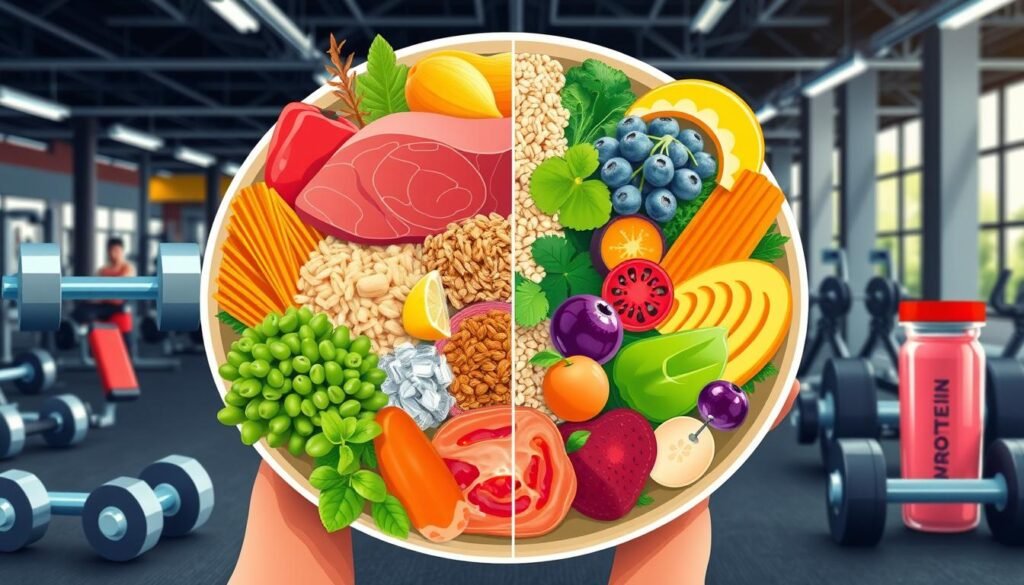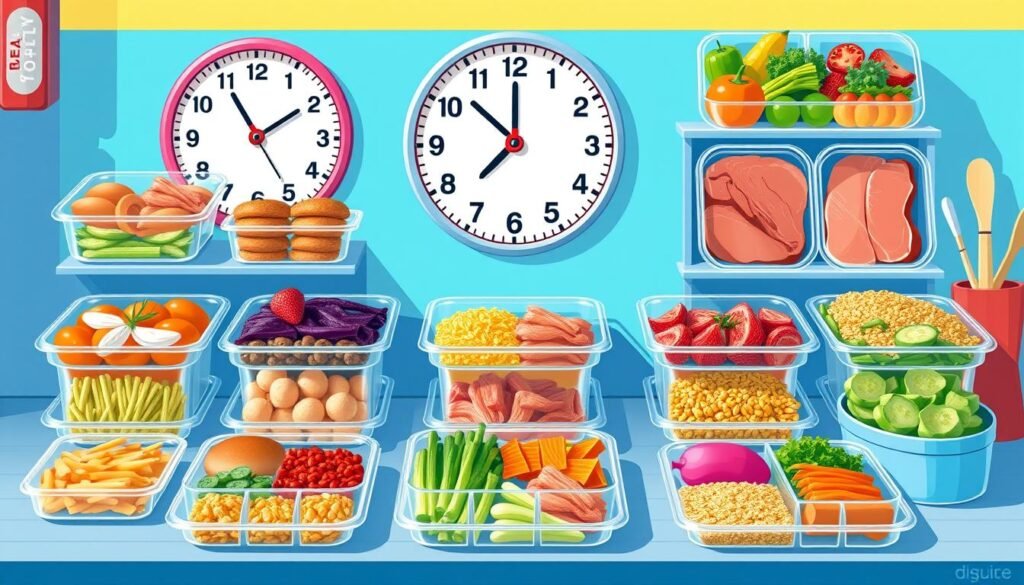Did you know bodybuilders’ common meal frequency might be off track? Traditional advice says to eat 5-7 small meals a day. But new studies show this might not affect metabolism or muscle growth much. For those bulking up, it’s key to know how often to eat for the best muscle increase without too much fat.
With more people trying intermittent fasting, the call for frequent meals during a bulk fades. Despite old beliefs, it seems the number of meals may not be as crucial. It’s better to look at your own needs, lifestyle, and goals to set your meal pace. This way, you’ll likely see better body changes and get more from your bulking phase.
Key Takeaways
- The recommended protein intake for muscle growth is 1.6 to 2.2 grams per kilogram of body weight.
- Consumption of 20-30 grams of protein before workouts is beneficial for muscle recovery.
- The anabolic window for optimal recovery and growth is within 30-60 minutes post-exercise.
- Current studies show that eating many smaller meals may not significantly affect metabolic rates.
- Intermittent fasting could offer benefits like improved insulin sensitivity, depending on individual needs.
- Tailoring meal times around workouts can optimize muscle development.
Understanding the Importance of Meal Frequency
Meal frequency is key in a Bulking Strategy. It affects metabolism and Muscle Maintenance. For years, bodybuilders believed eating often stops muscle loss. It also keeps blood sugar levels even. This idea is still followed today.
But, recent research shows our bodies adapt to different eating schedules. They can still grow muscles. A good workout plan and quality food matter more than meal timing. And healthy people control their blood sugar well, even with less frequent meals.
Pros have timed their meals for over 50 years. Dr. John Ivy found a special time right after working out. In this 15-60 minute period, our bodies quickly soak up nutrients. This is crucial for those trying to bulk up. Yet, everyday gym-goers might not need to eat so often.
So, there’s more to Importance of Meal Frequency than just how often we eat. It’s about the whole diet plan. And customizing meals to fit our own goals and daily life.
Meal Frequency During a Bulk: Common Misconceptions
Many people bulking up face myths about how often to eat. A common myth is that you need many small meals to boost metabolism and prevent “starvation mode.” But current research says eating fewer meals can still help muscle growth.
Studies have looked into these myths. They found that eating more often doesn’t mean you burn more calories or improve body shape. One study showed eating three times a day is as effective as six when it comes to fat loss and energy use. It all comes down to how many calories you consume.
A 2019 study showed eating more than four meals a day could improve cholesterol levels and lower triglycerides. But, not all research agrees on the best meal frequency for everyone. Some benefits like better diet quality and lower disease risk exist, yet there’s no one-size-fits-all answer.
People eating less often may feel hungrier. This can make reaching calorie goals during bulking harder. The USDA’s 2020 report says the evidence isn’t strong enough to link meal frequency with avoiding weight gain long-term.
| Study Type | Findings |
|---|---|
| Cross-Sectional Study (2019) | More than four meals improve HDL cholesterol and lower fasting triglycerides. |
| Comparative Study | No difference in energy expenditure between three vs. six meals. |
| Observational Study | Healthy adults prevent weight gain by eating less frequently. |
| AHA Review | Greater eating frequency linked to lower diabetes and cardiovascular risk. |
In the end, meal frequency might not be as crucial as we thought. Both more frequent and fewer larger meals have benefits depending on what you need. It’s better to focus on overall diet, how much protein you get, and your exercise routine rather than just meal timing.
The Science Behind Muscle Growth
The science of muscle growth is all about understanding how muscles get bigger and stronger. After working out, our bodies need to fix and build muscle. Eating enough protein throughout the day is key to this process.
Experts say you should eat protein across different meals. Eating 20-40 grams of protein every three hours keeps muscle building going strong. This way of eating helps keep a good balance of protein, which is vital for getting stronger.
When you eat protein is also important for building muscle. There’s a special time after working out called the anabolic window. This is when your body can really use nutrients to heal and grow. Even though eating more often can make you hungrier, it doesn’t mean you’ll burn more calories every day.
| Training Frequency | Body Composition Change | Protein Intake Frequency |
|---|---|---|
| Higher Frequency | More Hypertrophy (p | 20-40 grams every 3 hours |
| Lower Frequency | Less Hypertrophy | Less Optimal Protein Balance |
Research has shown different results with training often or not as much. People who train more often see their muscles grow by 0.58% each week. But those who train less only see a 0.42% increase. High-protein meals, eaten regularly, can really push muscle growth, no matter who you are.
Knowing these facts can help anyone plan better diets and workouts. This way, you can gain muscle effectively without gaining unwanted fat.
Calorie Surplus: Fueling Your Bulk Effectively
Aiming for an effective bulk means planning a calorie surplus wisely. You should add 250 to 500 calories on top of what you need daily. This helps muscle growth, key for avid lifters.
To start, figure out your Total Daily Energy Expenditure (TDEE) and then add the extra calories. Protein is crucial, needing 0.8 to 1 gram per pound of your weight every day. If you weigh 150 pounds, aim for 120-150 grams of protein, focusing on high-quality sources like meat for all amino acids needed.
It’s also key to eat enough healthy fats, aiming for 20-30% of your daily calories. Foods like avocados, nuts, and fatty fish are great. Carbs are needed too, for energy during intense workouts and recovery. For those with fast metabolisms, moderate cardio can help manage weight during this phase.
Doing exercises like squats, deadlifts, and bench presses is crucial for making gains. A bulking period usually goes for 4-6 months, giving time for muscle growth. Eating a meal with protein and carbs right after working out helps with recovery and muscle repair.
Eating a small, protein-rich meal before sleep helps muscles recover overnight. Getting 7-9 hours of sleep and taking enough rest days are essential for recovery. Keep track of your progress to adjust your diet and workout plan for a better bulk.
Effective nutrition and energy management are crucial for fighting fatigue during an intense bulking phase.
Meal Timing and Its Impact on Growth
Meal timing plays a big role in muscle growth and recovery. It’s key to know about the anabolic window. This period right after working out is crucial. Your body can use nutrients then to boost recovery and muscle building.
The Role of the Anabolic Window
The anabolic window lasts a few hours after exercise. It’s important to eat the right stuff then. A mix of protein and carbs after working out helps muscles recover and grow. Getting enough protein is tricky. Studies often give mixed messages because they’re small or don’t last long. Yet, most experts agree on getting 1.6 to 2.2 grams of protein per kilo of body weight every day for the best muscle growth.
Some say our bodies can only handle 20-25 grams of protein at once, but that’s not always true. Different proteins are absorbed differently. That’s why eating protein throughout the day is suggested by research. If you work out a lot, it might help to eat more often.
Strategic Eating Around Workouts
Eating right around workout times is key for energy and recovery. A small protein snack before and after exercising can help. It boosts energy and speeds up recovery. Studies show that spreading protein intake across the day leads to better muscle building than just eating a lot at one meal.
Drinking enough water is equally important. Athletes should drink 1.5 to 2 liters daily during bulking up. This keeps cramps away and improves exercise results. Managing cramps well also means knowing about electrolytes and nutrition. To learn more, check out this helpful guide.
Nutrient Partitioning: Optimizing Your Macros
Nutrient partitioning is key in how the body uses nutrients for muscle growth or fat storage. Knowing how to balance macros greatly impacts your muscle nutrition strategies. By choosing the right foods, people can build more muscle and keep fat low.
Eating 4,200 clean calories across six meals is better for muscle growth than 3,000 dirty calories in three big meals. This shows how important meal timing is for nutrient partitioning.
The Parrillo Nutritional System helps athletes eat 5,000 to 10,000 calories daily without gaining too much fat. It focuses on clean calories and supplements. Managing hormones like insulin also helps with muscle and fat control.
Knowing how hormones react is key to using nutrients well. A diet rich in protein, with moderate carbs and low fat, helps keep muscle when cutting. Getting enough protein is important for muscle repair and growth.
Every macronutrient plays a crucial role. Protein, at 4 calories per gram, keeps muscle up. Fats, giving 9 calories per gram, help with hormones and absorbing nutrients. Carbs, also 4 calories per gram, are needed for powering workouts.
To wrap up, knowing nutrient partitioning can change your approach to muscle nutrition. Adjusting macros for your activity and eating times, and increasing insulin sensitivity when bulking, can greatly boost muscle growth and body composition.

Benefits of Eating Smaller, Frequent Meals
Eating smaller, frequent meals has many benefits. It’s especially good for those trying to add calories carefully during bulking up phases. This way of eating helps get the needed calories without taxing the digestive system too much.
Easier to Achieve Caloric Goals
People find it easier to meet their calorie needs with smaller meals throughout the day. Studies show that the number of meals doesn’t affect weight or muscle gain if calories are the same. For example, spreading 2000 calories over six meals gives you about 333 calories each time. This keeps your energy levels steady, improving focus and daily performance.
Stabilizing Blood Sugar Levels
Having meals more often helps keep your blood sugar steady. This is crucial for your health. It reduces cravings and boosts energy levels, making you function better daily. Eating at regular times is also better for digestion and getting the most out of your food. This routine should match your lifestyle and keep your energy up. For more details on how eating frequency affects your body, check out the research studies available.
Intermittent Fasting: Is It Suitable for Bulking?
Intermittent Fasting is known for its health perks. Still, its Bulking Suitability is debated for muscle building. This diet limits when you can eat, making it hard to get the calories needed for muscle growth.
Intermittent fasting comes in forms like the 16/8 method, with an 8-hour eating window, and alternate-day fasting. While these can help lose fat, the Fasting Effects on Muscle Gain might not be great. Research shows fasting could lead to a slight drop in muscle mass over time.
Even though some studies say you can keep muscle mass with resistance training while fasting, getting enough calories for bulking up is tough. It’s crucial, yet hard, to eat enough protein during limited eating times. Planning meals carefully can help meet bulking aims.

Some seasoned lifters have mixed intermittent fasting into their regimens. Yet, most see better muscle gains with regular eating schedules. So, knowing intermittent fasting’s limits is key for successful bulking.
Addressing Metabolic Adaptations During a Bulk
Understanding metabolic adaptations is key when focusing on muscle growth during a bulk. The balance of energy, affected by how often we eat, greatly influences our metabolism’s functioning. Our body’s reaction to diet and exercise changes leads to metabolic shifts. This matters a lot for those aiming for big muscular improvements.
How Meal Frequency Affects Metabolism
Studies show that how often we eat can shape our metabolism, particularly in nutrient utilization for growth. For example, eating three well-balanced meals daily can fine-tune our metabolic reactions. Including low-energy foods like vegetables, lean proteins, and legumes in a bulking plan helps keep you full. This approach avoids too many calories while supporting muscle growth.
Balancing nutrients such as fiber, protein, and fats is key to feeling satisfied and controlling calorie intake. Avoiding processed foods is crucial as they encourage overeating by not making you feel full. Eating foods that are harder to chew can also make meals more fulfilling.
Protein is essential for feeling full because it triggers the release of a hormone named CCK. This hormone makes digestion slower, extending the feeling of fullness. Carbs help control appetite through their impact on insulin and have properties that can stop overeating. High-fiber carbs slow down digestion and make meals more satisfying due to their bulk.
To maximize metabolic efficiency and muscular growth, mix different nutrients and textures in your meals. Though nutrient-packed shakes can help increase calories, they’re not as filling as solid food. Using these tips can guide dietary decisions during a bulking phase. This ensures proper management of metabolic adaptations.
Finding Your Ideal Meal Frequency
Finding the right Ideal Meal Frequency is key for growth during a bulking phase. It’s important to look at your eating habits, lifestyle, and how your body responds. For example, if you’re focusing on Ectomorph Bulking, which means you typically have a smaller appetite, eating more often can help you hit your calorie needs with ease.
Using Personalized Nutrition helps tailor an eating schedule that you’ll stick to and enjoy. This custom plan helps ensure you get the right amount of calories and nutrients for muscle growth. Ideally, you should eat every 2-4 hours to keep nutrients flowing for recovery and growth.

- Track your body weight and muscle gains to fine-tune how often you eat.
- Plan your nutrient intake around workouts for the best recovery.
- Try different meal sizes and frequencies to see what works best for your energy and satisfaction.
Using these tips will help you stick to your calorie goals and enjoy your food more. Learn more about meal planning from this lean bulk meal plan.
| Meal Frequency | Calories | Protein | Carbohydrates | Fats |
|---|---|---|---|---|
| Every 2 Hours | 3,235 | 200g | 429g | 80g |
| Every 3 Hours | 3,000 | 180g | 400g | 70g |
| Every 4 Hours | 2,800 | 160g | 350g | 60g |
Searching for the Ideal Meal Frequency is a journey. Remember, consistent training, a healthy diet, and good sleep are critical. With dedication, you’ll find the meal timing that’s perfect for you.
Conclusion
Knowing how often to eat during a bulk is key for anyone wanting to grow muscle. This Meal Frequency Summary shows us some prefer eating small meals often. Others do well with big meals less frequently. It’s important to figure out what works best for you. This way, you can enjoy your diet while still meeting your calorie needs.
For muscle growth, it’s good to pay attention to when and what you eat. Eating about 20-25 grams of top-quality protein across several meals helps with this. This Muscle Growth Strategy isn’t just about how much you eat. It’s also about how nutrients are spread out through the day. The way you arrange your meals can really affect your results.
Each person’s bulking journey is their own. Some might like eating often, while others prefer bigger meals less often. What matters most is eating quality foods, keeping up with your workouts, and balancing everything. This balance should help both your health and your muscle-building goals.